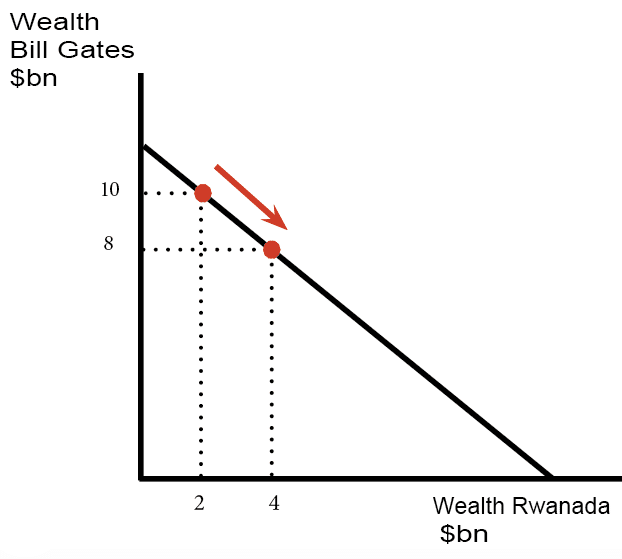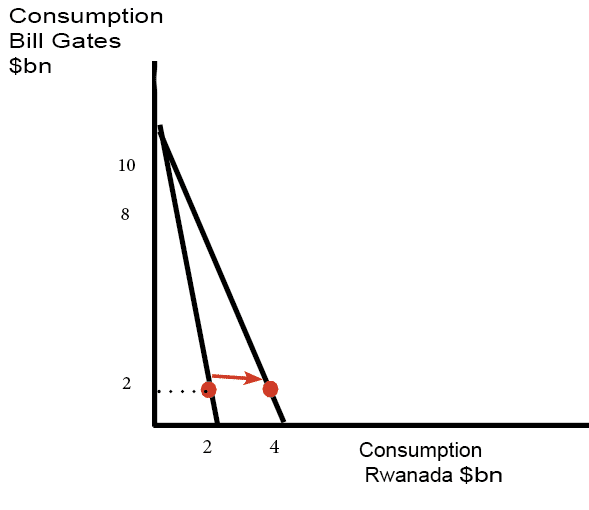Readers Question: Pareto efficiency occurs (as you say) ‘when it is impossible to make one party better off without making someone worse off’. Assume (and Economics seems to do this a lot) two people live in the world. One is a multi-billionaire and the other has no money at all. If the rich guy gives the other guy a few bob this is not Pareto efficient as the former is worse off! Isn’t this complete codswallop? And Pareto won a Nobel Prize for this! Am I missing something here? What do you think?
Usefulness of Pareto efficiency
If we were building a new airport – let us assume there are winners and losers
- The private and external benefits are estimated at £20bn
- The cost of building airport is £13bn
- Residents living nearby see a loss in personal welfare of £1bn
- The net benefit to society is £20bn- £14bn. A clear gain of £6bn
- However, using principles of Pareto efficiency – this is not a Pareto improvement because those living nearby lose out.
What should we do? The scheme has a net welfare gain – but some lose out.
- One option is to make the airport company compensate local residents for the inconvenience of losing out.
- In this way, the airport goes ahead, and the company make a profit, but local residents are compensated for losing out.
Example of giving to charity
Firstly it depends on how you define utility. If a billionaire gives money away to charity – he has less money – so from one perspective, he is financially worse off.
If Bill Gates gives money to Rwanda, his wealth declines and Rwanda becomes wealthier.
However, if Bill Gates has wealth of $10 billion, he may be unable to spend it. If we measure by consumption, if he gives to Rwanda; his consumption remains unchanged, but Rwanda gains increase in consumption. If we measure by consumption, there is a Pareto improvement
Giving wealth to Rwanda doesn’t reduce consumption of Bill Gates, but does increase consumption of Rwanda.
Utility
Another factor is maybe Bill Gates gets joy from giving to charity – certainly more joy than having money in a bank account. So, if Bill Gates gives money to developing economies, it can be definitely a Pareto improvement
- Bill Gates gets joy from giving money
- Bill Gates worries less about having $50 billion in bank account
- Developing economies gain from capital investment to alleviate poverty.
Limitations of Pareto Improvement
Pareto efficiency can have its uses and may form part of the decision making process. But also it has its limitations.
- It makes no judgement about the equality of distribution or overall welfare.
- A distribution of income could be Pareto efficient, but not maximise overall social welfare.
- It could involve some resources being wasted – as long as no one feels worse off.
- From a utilitarian perspective, we should consider the utility that income gives. If we transfer money from the rich to the poor, it is not a Pareto improvement in terms of wealth – the rich are worse off. But, such a decision may increase overall utility in society because of diminishing the marginal utility of money. A billionaire wouldn’t really notice not having less income, but the developing economy or individual living in poverty would see a significant increase in well-being from a small increase in income.
Related pages



Awesome….i now v an idea about pareto efficiency
Imagine you build a highway project and destroy lands of agriculturists and forests. In this case, a government may show monetary costs and benefits where the road is only used for crony capitalists to transport goods. The people lose thousands of their houses and forest loses its biodiversity. The environmental costs are not at all taken. Beyond doing a Pareto analysis or cost benefit analysis, a government has to do environmental analysis and incorporate those costs in Pareto analysis. If not, only wealth and not welfare will be taken into account.
Thankyou for sharing valuable knowledge best site for economics.it expound all complicated data in simple way🥭
Wow. I was not guided toward Paretto thinking in Economics classes. Although production possiblity curves were presented. Studying on my own I became perplexed about “Paretoism”. It can be a head scratcher. Readers may be want to look at The Problem of Social Cost by Ronald Couse (sp?).